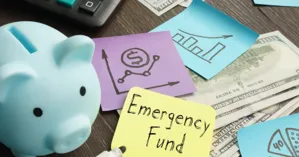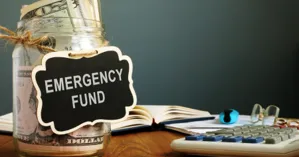
Nobody ever thinks that they’ll have an emergency. But they do happen. And if your car suddenly breaks down or you break your leg, you’ll need money to pay for it. Even if you have insurance, there’s a deductible.
What you need is an emergency fund. Emergency funds act as a financial safety net, preventing reliance on debt during unexpected expenses. When you’re in college, you might not have a lot of money to put away. We’ve got you covered. Here’s a guide to setting up an emergency fund for college students.
What is an Emergency Fund?

An emergency fund is a cash reserve specifically set aside for unplanned expenses or financial emergencies. Think of it as your financial safety net, providing you with the security and peace of mind to handle unexpected expenses without going into debt. Whether it’s a sudden car repair, an urgent medical bill, or an unexpected trip home, having an emergency fund means you’re prepared for life’s surprises. This fund is not for routine monthly expenses or discretionary spending; it’s strictly for those moments when you need immediate financial support.
Why College Students Need Emergency Savings

College life is full of surprises, and not all of them are pleasant. That’s why having emergency savings is crucial for students. Without an emergency fund, you might find yourself relying on credit cards or loans to cover unexpected expenses, leading to debt that’s tough to shake off. An emergency fund helps you avoid this financial stress, allowing you to focus on your studies and achieve your academic goals. Plus, knowing you have a financial safety net can provide immense peace of mind, making your college experience less stressful and more enjoyable.
Assessing Your Financial Standing

Before you can start building an emergency fund, it’s essential to assess your financial standing. This means taking a close look at your income, expenses, debts, and current savings. Understanding your financial situation will help you determine how much you can realistically save each month and set a target for your emergency fund. Identify areas where you can cut back on expenses to free up more money for savings. This assessment is the first step towards creating a robust emergency fund that can support you through unexpected financial challenges.
Why Every College Student Needs an Emergency Fund

Most college students want to be independent, and having an emergency fund is part of that independence. This means you can avoid running back to mommy or daddy when you have a monetary problem.
An emergency fund is cash you’ve put away in a savings account. It’s used to protect you against unexpected expenses. It’s like a financial safety net.
Another benefit of creating an emergency fund is it helps you develop good financial habits.
When you graduate, you may need some money to help you out until you get a job. It will cover your rent and other expenses, like student loans.
The bottom line is that having that fund will help you sleep at night and enhance your financial security. There are several ways to build an emergency fund.
Determine How Much You Need
You probably have a pretty good idea of what expenses are coming up. Write down what is about to hit and how much they’ll cost.
If you have a car at school, check whether it’s in good condition or needs work. Also, check your computer and cell phone and decide if you’ll need new ones in the future.
And although you can’t predict every expense ahead of you, you can at least estimate the dollar amount you know.
Once you consider your expenses, set a goal for your emergency fund to cover three to six months' worth of living expenses, including essential costs like rent, utilities, and food.
Develop a Budget with Your Emergency Fund
Look at your income, daily expenses, and spending habits to determine how much you can afford to stash away. If you determine you need $1,500 in your emergency fund, consider saving $50 per pay until you achieve that number.
If you don’t have extra money in your budget, you might need to get a part-time job or at least extra hours at the one you have. If that’s not possible, think about selling some of your belongings online.
If you have a summer job, ensure you deposit as much as possible in your emergency fund. It’s ok to have fun but remember your goal and keep your eye on the ball.
Understand What an Emergency Is and Prepare for Unexpected Expenses
There’s a reason it’s called an emergency fund. It should only be used for an emergency. An emergency is likely to be a:
-
car repair
-
medical or dental bill
-
sudden expense like an unexpected trip home for a problem
An emergency is not that new coat or concert tickets. The emergency fund should be sacred and never be touched for a “want”. It should only be used for a “need”.
Cut Your Spending
Look where you spend your money. Do you really need to eat pizza three nights a week? The food in the cafeteria isn’t the best, but it’s part of your room and board. It’s paid for, so why pay for food when you don’t need it? We’re not saying never go out, but just keep it to a minimum.
Evaluate whether you need a car on campus. Is that an expense you can do without?
Be brutal with your expenses and cut out what you really don’t need. Establishing an emergency savings fund is crucial for financial security during unexpected events.
Open a High Yield Savings Account
Open a high-yield savings account. Online banks have these, and it’s easy to open an account. Do not combine your emergency fund with your regular savings account. You’ll end up dipping into it.
Instead, consider money market accounts or a separate high-yield savings account that you’ll have access to but isn’t convenient like your checking account.
Automate Your Savings
Ask work if they can automatically deposit part of your paycheck into your savings account. If not, set up an automatic transfer from your checking to your savings account via mobile or online banking. Automating your savings helps ensure a secure financial future by consistently setting aside funds for emergencies and long-term goals.
Overcoming Financial Challenges

Building an emergency fund isn’t always easy, especially when you’re dealing with irregular income, high expenses, or existing debt. However, with a solid plan and some discipline, you can overcome these challenges. Start by creating a budget that prioritizes savings. Look for ways to cut back on non-essential expenses and consider increasing your income through part-time work or side gigs. Automate your savings by setting up automatic transfers from your checking account to your savings account. Additionally, take advantage of one-time financial boosts, like a tax refund, to quickly build up your emergency fund. Remember, every little bit helps, and with persistence, you’ll create a financial safety net that provides security and peace of mind.
Review Your Savings Plan

Review your savings plan regularly to ensure you are on track to meet your goal. Keep in mind that the budget is flexible, so if necessary, you can make changes. When life changes, you can adjust your plan.
If you are making more money, then step up your plan to fund your emergency fund. Even if you are making less, don’t give up on saving. Just step back on how much you put away.
While saving, celebrate milestones to stay motivated. Keep reminding yourself how important this is.
Stick with It
It takes discipline to keep putting money in an emergency fund. But ensure you contribute weekly or monthly. Avoid the temptation to spend it on trivial items.
Your fund is an investment in yourself. Aren't you worth it?
Conclusion
If you had a monetary emergency, could you weather it? You need an emergency for life’s unexpected curve balls. But only use it for emergencies. Having an emergency fund is the grown-up thing to do.



